The Intel Core i9-9900KS Review: The 5 GHz Consumer Special
by Dr. Ian Cutress on October 31, 2019 10:45 AM ESTCPU Performance: Encoding Tests
With the rise of streaming, vlogs, and video content as a whole, encoding and transcoding tests are becoming ever more important. Not only are more home users and gamers needing to convert video files into something more manageable, for streaming or archival purposes, but the servers that manage the output also manage around data and log files with compression and decompression. Our encoding tasks are focused around these important scenarios, with input from the community for the best implementation of real-world testing.
All of our benchmark results can also be found in our benchmark engine, Bench.
Handbrake 1.1.0: Streaming and Archival Video Transcoding
A popular open source tool, Handbrake is the anything-to-anything video conversion software that a number of people use as a reference point. The danger is always on version numbers and optimization, for example the latest versions of the software can take advantage of AVX-512 and OpenCL to accelerate certain types of transcoding and algorithms. The version we use here is a pure CPU play, with common transcoding variations.
We have split Handbrake up into several tests, using a Logitech C920 1080p60 native webcam recording (essentially a streamer recording), and convert them into two types of streaming formats and one for archival. The output settings used are:
- 720p60 at 6000 kbps constant bit rate, fast setting, high profile
- 1080p60 at 3500 kbps constant bit rate, faster setting, main profile
- 1080p60 HEVC at 3500 kbps variable bit rate, fast setting, main profile
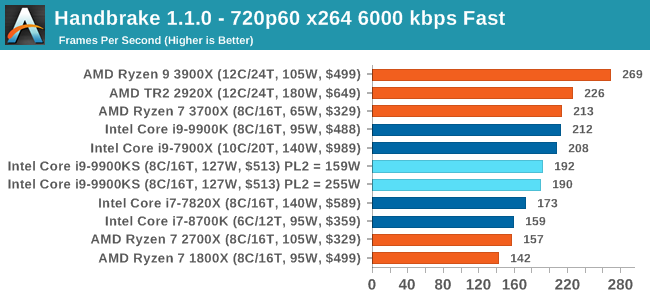
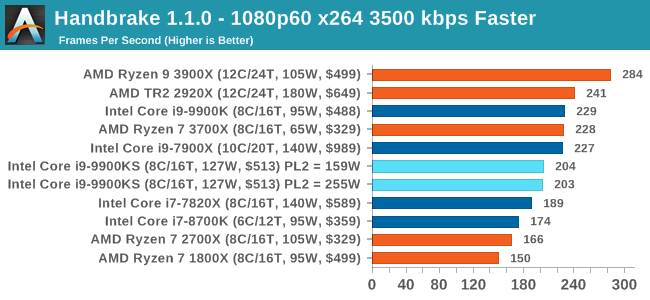
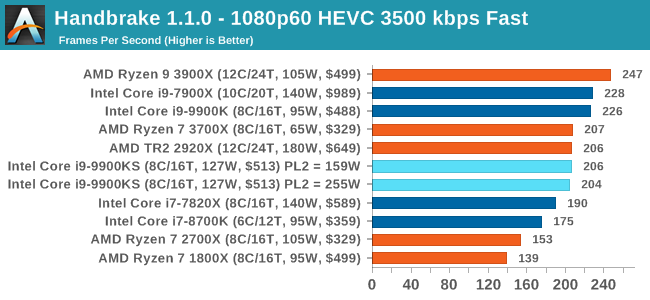
The 9900KS performed worse than our 9900K in our Handbrake tests, and we're not entirely sure why. It might be related to the regression we saw with DigiCortex.
7-zip v1805: Popular Open-Source Encoding Engine
Out of our compression/decompression tool tests, 7-zip is the most requested and comes with a built-in benchmark. For our test suite, we’ve pulled the latest version of the software and we run the benchmark from the command line, reporting the compression, decompression, and a combined score.
It is noted in this benchmark that the latest multi-die processors have very bi-modal performance between compression and decompression, performing well in one and badly in the other. There are also discussions around how the Windows Scheduler is implementing every thread. As we get more results, it will be interesting to see how this plays out.
Please note, if you plan to share out the Compression graph, please include the Decompression one. Otherwise you’re only presenting half a picture.
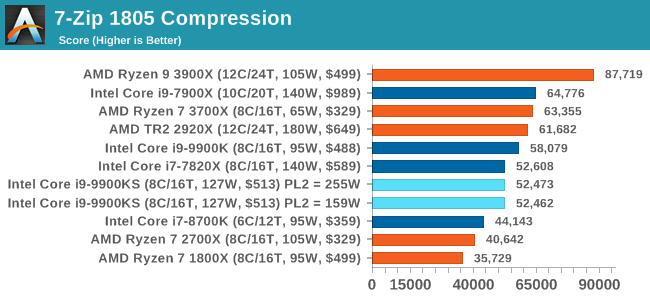
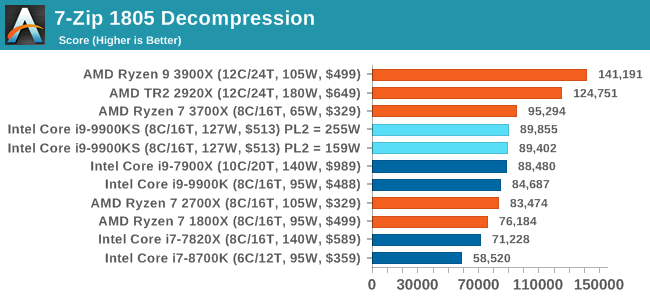
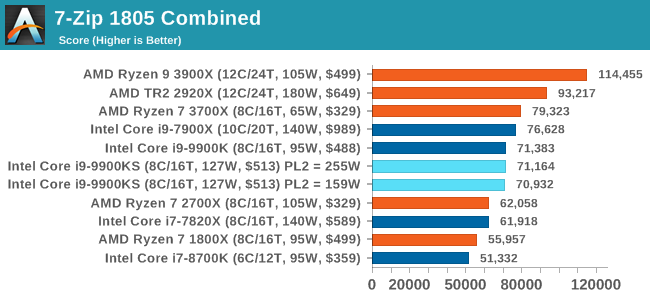
Both the 9900KS settings perform identically here, however the Compression test shows a performance regression compared to the standard 9900K. It does make me wonder if there are additional differences between the two chips (such as an internal clock).
WinRAR 5.60b3: Archiving Tool
My compression tool of choice is often WinRAR, having been one of the first tools a number of my generation used over two decades ago. The interface has not changed much, although the integration with Windows right click commands is always a plus. It has no in-built test, so we run a compression over a set directory containing over thirty 60-second video files and 2000 small web-based files at a normal compression rate.
WinRAR is variable threaded but also susceptible to caching, so in our test we run it 10 times and take the average of the last five, leaving the test purely for raw CPU compute performance.
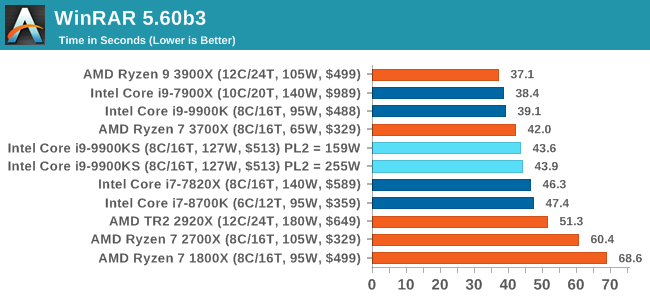
AES Encryption: File Security
A number of platforms, particularly mobile devices, are now offering encryption by default with file systems in order to protect the contents. Windows based devices have these options as well, often applied by BitLocker or third-party software. In our AES encryption test, we used the discontinued TrueCrypt for its built-in benchmark, which tests several encryption algorithms directly in memory.
The data we take for this test is the combined AES encrypt/decrypt performance, measured in gigabytes per second. The software does use AES commands for processors that offer hardware selection, however not AVX-512.
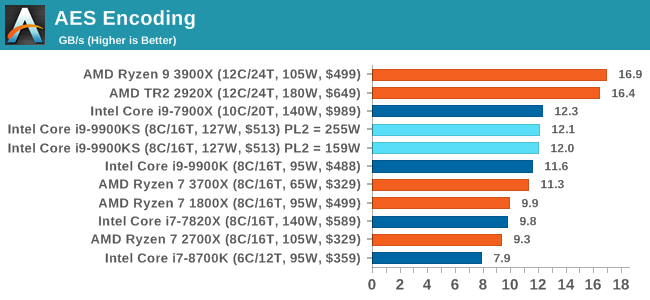










235 Comments
View All Comments
Spunjji - Friday, November 1, 2019 - link
172W for 8 cores at 5Ghz with the 9900KS142W for 12 cores at ~4.2Ghz for the 3900X.
The X570 chipset TDP is around 15W, 6W for Z390. There's simply no aspect of power efficiency where Intel come out on top here.
Sivar - Friday, November 1, 2019 - link
Please read the first couple of sentences before criticizing.No one is saying the 9900KS is a power efficiency winner. Indeed, when running compute-intense tasks, AMD's larger CPUs are likely the winner most of the time, but you cannot post one set of measurements with one specific configuration and draw broad conclusions. Other measurements differ, and most pit the idle power draw (where most PCs remain most of the time) as lower for Intel. For example,
https://www.guru3d.com/articles-pages/amd-ryzen-7-...
Korguz - Friday, November 1, 2019 - link
thats funny.. cause before zen.. thats what people were saying about amd.. and the power those chips use. now its the opposite, and its ok for intel to use so much power ??? come onvMax65 - Friday, November 1, 2019 - link
Just to add to this...der8aur just tested the 9900KS and it runs games all core 5GHz all the time at between 98w and 126w....Video showing this starts at 3:50..the only time it uses more power is if you are doing high compute loads and or with AVX workloads...but for gaming, it will stay well below...https://www.youtube.com/watch?v=YWSn0cHauJ4
Korguz - Friday, November 1, 2019 - link
well, this review, says other wise. maybe different test setups ??Jorgp2 - Thursday, October 31, 2019 - link
That's because AMDs CPUs were woefully underpowered.Intel is still more efficient in the mobile space
evernessince - Friday, November 1, 2019 - link
Humans find ways to defend their purchases. RTX 2080 Ti owners have 1,200 reasons to defend theirs.AshlayW - Friday, November 1, 2019 - link
If I only I could upvote this post...vMax65 - Friday, November 1, 2019 - link
Surprising that it seems to hurt some that others might want to buy a RTX 2080Ti or a 9900K or a Ferrari for whatever reason. Are we now all to be lambasted for buying anything that maybe costs more?...or heaven forbid they want the best!!! Oh no...run!!! You might as well start on all those that buy better shoes, cookers, microwaves, TV's, bread, cars, chocolates, phones etc, etc ad infinitum or for that matter any branded products period as they cost more than there non branded counter parts...Hold on, we are not going far enough, here's an idea, lets all wear the same clothes, live in the same houses, watch the same TV, eat the same gruel, have only one manufacturere of all products.......so no one can be different and most importantly we certainly do not want any choice, creativity, design et all....Madness......
Midwayman - Thursday, October 31, 2019 - link
I'm mostly reading its a bad time to buy a 9900K since intel will have binned out all the golden samples.